Eurovision: How the song contest is bringing Europe together again
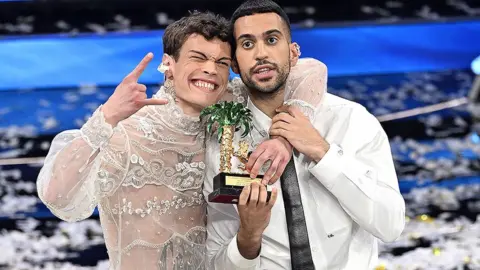 Getty Images
Getty ImagesAt a sold out London gig the crowd are chanting "Mahmood! Mahmood! Mahmood!" as the Italian star plays the penultimate show of his European tour, before heading to perform at Eurovision this week.
"I was waiting so badly for this moment," the 29-year-old tells Radio 1 Newsbeat at the show.
"The best thing about this job - writing and composing music - is the final result. The final result is the concert because you receive the energy from the people that listen to your music".
Like all singers, the pandemic forced Mahmood to postpone his tour, meaning he couldn't lap up the global success his hit Soldi had after he came second in 2019's Eurovision.
With more than 200 million streams on Spotify, (and roughly the same on YouTube), Soldi changed his life and built him a dedicated fan base.
After rock group Måneskin won for Italy last year, the song contest is being hosted in Turin where Mahmood will participate once again, performing ballad Brividi as a duet with 19-year-old Blanco.
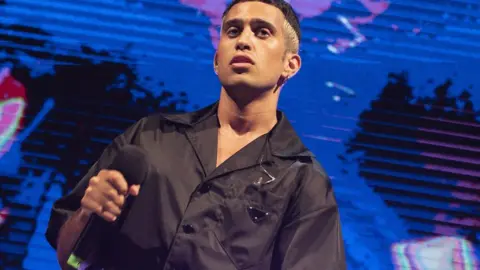 Getty Images
Getty ImagesBrividi is an early favourite and the most streamed song of this year's entrants, but it was Blanco who suggested it should be put it forward as a contender in an Italian TV show that decides the entry.
"The first Eurovision he saw was in 2019 with me singing Soldi," says Mahmood.
"He's super happy to do it and we're excited because it's a big opportunity to show our music to a lot of people."
As well as Mahmood's return, restrictions easing across Europe has meant much-loved events in the run up to Eurovision have been held for fans for the first time in three years.
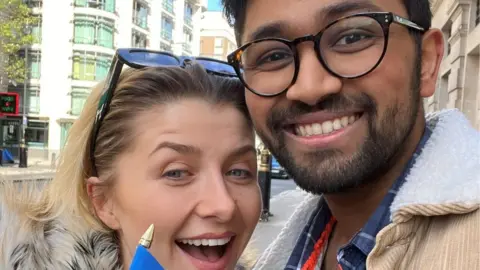 Aaran
AaranIn early April 22-year-old Aaran went to London's Eurovision Party with friends he's made through his love of the competition.
"We're so far from each other for most of the year," he tells Newsbeat.
"It was so nice to see them after a long time of just seeing them online."
Aaran's currently revising for exams - and jokes the contest being in May isn't great for him as sometimes he gets distracted watching rehearsal footage.
For him "there's never a time when you don't have the chat talking about Eurovision" but "December's when we start properly thinking about the next one."
"The day after I joined Twitter I got added to a group chat and suddenly there were so many people I didn't even realise I could talk to and it was a wow moment of like: 'Oh, my goodness, I'm not alone'," he says.
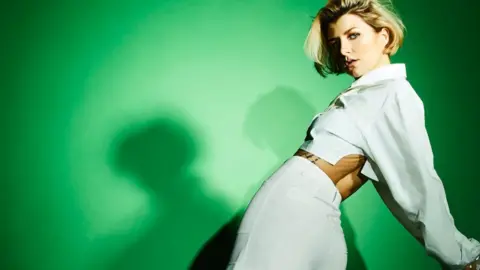 SVT
SVTFor artists like Cornelia Jakobs, playing to fans across Europe is a taste of what Turin will be like - where around 200 million viewers will watch around the world.
Despite strong suggestions she can match Ireland's record of seven wins for Sweden with her song Hold Me Closer, the 30-year-old says she isn't feeling the pressure of being likened to superstars like Robyn or Pink because of the team around her.
"It's crazy how much work it is for a three minute minute performance, with weeks and even months behind it," she tells Newsbeat.
"I feel excited to have the honour to represent Sweden and sometimes think: 'Why am I not more nervous about this?'"
Some acts, and countries, take the competition more seriously than others by working with teams behind some of the world's biggest popstars to help them deliver a performance that'll be remembered, and crucially get votes.
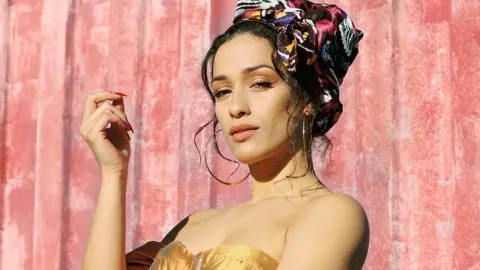 TVE
TVESpain's Chanel has teamed up with one of the world's most in-demand choreographers, Kyle Hanagami, who's worked with Jennifer Lopez, Blackpink, and Ariana Grande.
"He asked for me," she tells Newsbeat - still not quite believing it. "He saw me dancing on Instagram and asked to choreograph SloMo."
Chanel herself has been backstage, at various events, mixing with other artists - something that couldn't happen last year due to restrictions - and learning their routines.
But it's on that stage she's hoping to launch her career internationally, in a similar way to last year's winners Måneskin who've since gone global.
Her performance is highly produced with a slick dance break that's been impersonated by nearly 1m TikTok users doing the #slomochanelchallenge.
But it's the United Kingdom who's sending one of TikTok's most followed musicians, Sam Ryder, who is from Maldon in Essex.
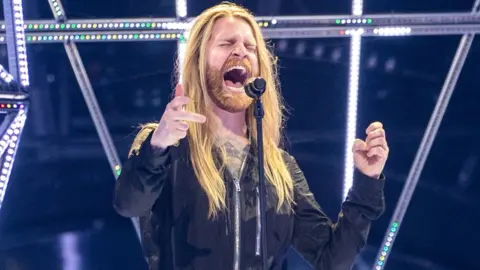 EBU / ANDRES PUTTING
EBU / ANDRES PUTTINGAfter two consecutive years of coming in last place (the UK didn't get a single point in 2021), there's been a huge shift and some fans believe UK could actually win this year.
Other contestants have referenced Sam during interviews, knowing him from posting covers online, and plotting how they're going to get a selfie.
"I'm just completely grateful people in the competition are stoked to have me on board as well," he tells Newsbeat as he's on his way to meet some of the artists for the first time.
"I'm incredibly excited to make some friends, chat some music, and just take in every moment of this beautiful, wild bonkers thing."
For BBC Radio 1 to play a Eurovision song on heavy rotation is highly unusual but Sam's broken the mould with Space Man, getting regular plays, and creating excitement online for the first time in years for British fans.
For many they'll be asking 'can we do it?', not quite believing it's possible, but once viewers see Norway's act they'll also have another question: 'Who's behind the mask?'
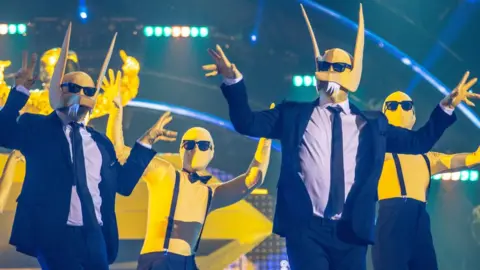 EBU / ANDRES PUTTING
EBU / ANDRES PUTTINGInterviewing Subwoolfer is difficult as the masked singers gesture with hand signals as a member of their entourage stands next to them and tries to translate for journalists.
But fans have been piecing together clues and, based on a clear British accent on stage and some cryptic Instagram captions, there's one suspect familiar to some.
Ben Adams from early '00s boyband A1 lives in Norway and has been absent from some recent gigs with the band.
Subwoolfer are expected to do well with the public vote - which counts for half of the results - with one of the most memorable performances in the contest.
But the public are also expected to vote in high numbers for Ukraine, with them odds-on favourite to win again, six years after the country's last triumph.
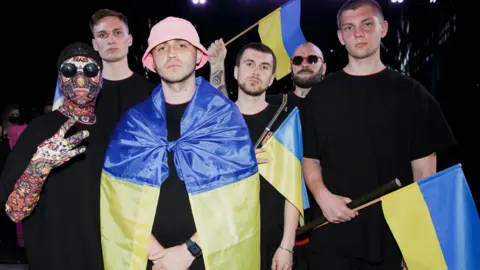 Getty Images
Getty ImagesUkraine had a tricky start to Eurovision in February with its original contestant withdrawing while being investigated for visiting Crimea, an area Russia seized control of in 2014.
The following month Ukraine was invaded and song contest organisers - with support from participating broadcasters from across the continent - banned Russia from taking part and Kalush Orchestra became the bookies favourite.
"We were in fifth position even before the war started, which proves that Europeans like our music," frontman Oleh Psiuk tells Newsbeat.
"Stefania was written and dedicated to my mother but when the war started it's gained new meanings because a lot of people started to see Ukraine as their mother."
It's expected to do well with public but it's not guaranteed to be the top song voted for by the national juries, who make up half the votes and agree to vote independently.
Should it win, victory will be bittersweet as it's highly unlikely it'll be safe enough to host the song contest in Ukraine next year, which is normally how the host country is decided.
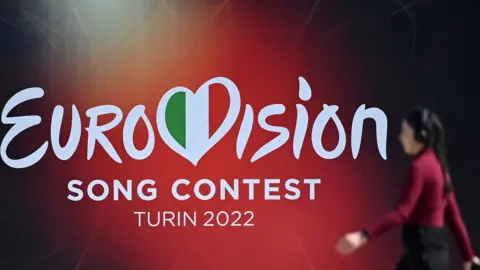 Getty Images
Getty ImagesReturning this year though, for the first time since 2019, is the party atmosphere Eurovision brings to a city with artists, journalists, and fans able to mix together.
Events are planned across Turin for the thousands of international fans travelling to the song contest for the first time since 2019, celebrating a return after a 2020 cancellation and the stripped back 2021 contest.
For Mahmood though, who's returning to Italy after his European tour, he says he's mainly excited to be able to sleep in his own bed at his Mum's house for a week.

Watch the first Eurovision Semi-Final on BBC iPlayer.
Watch the second Eurovision Semi-Final on BBC iPlayer.
Watch the Eurovision Song Contest Final on BBC iPlayer and BBC One, at 20:00 BST on Saturday 14 May.



